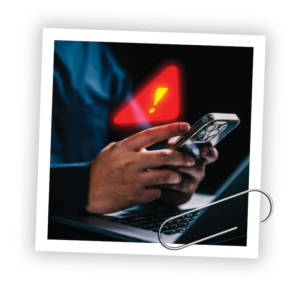How to Protect Yourself From Fraud
Unfortunately, fraud scams continue to evolve. By staying updated on current scams being reported, you can have a better idea of what to look for and when to be suspicious. The Federal Trade Commission issues scam alerts for common scams nationwide and the Better Business Bureau’s BBB Scam Tracker℠ can help with awareness of scams in your area. The more you know about fraud the less likely you are to become a victim. 
Please note: Local 804 FCU will not call or send texts asking you to provide, update or verify your personal or account information, such as passwords, Social Security numbers, personal identification numbers (PINs), credit or debit card numbers.
2 Ways Fraudsters Try to Get Your Personal Information
Social Engineering
Fraudsters pose as your friends or some organization you trust to fool you into revealing your personal information. These scams can look legitimate and can be difficult to detect. It usually takes on one of these forms:
- Phishing: Fraud through legitimate-looking emails or social media direct messages. These fake accounts have slight variations on legitimate addresses ([email protected] vs. [email protected]).
- Vishing: Voice phishing via phone calls
- SMiShing: Phishing via texts and SMS messages
- Business email compromise: Criminals exploit employees by sending emails that look like they’re from business associates requesting ACH transfers or other sensitive activity.
- Spoofed/Copycat sites: A form of online fraud that’s much like phishing, where fraudsters use bogus websites to retrieve a person’s confidential information.
- SIM swap: A form of fraud where fraudsters use social engineering to gather enough personal data to convince their victim’s mobile phone company to reassign the victim’s phone number to a different SIM card—one in the fraudster’s device. The victim’s phone loses network connection the minute that swap is completed. At that point, the fraudster can leverage the texts and emails to gain access to victim’s bank accounts, credit cards, and other sensitive information.
Malware
Malicious software installs on your computer or mobile device without your knowledge to monitor your use, redirect your computer to certain websites, record keystrokes, or enable unauthorized people to access your device. Once inside, fraudsters can steal information, send spam, and commit fraud. Beware of emails or texts from unknown sources, and never enter credentials on links sent to you.
How to Protect Yourself from Fraud
- Avoid malware by making sure to update your operating system and web browser regularly.
- Be careful with what information you share online or on social media. By openly sharing things like pet names, schools you attended, links to family members, and your birthday, you can give a scammer all the information they need to guess your password or answer your security questions.
- Beware of emails or texts from unknown sources, and never enter credentials on links sent to you. Don’t click on anything in an unsolicited email or text message asking you to update or verify account information. Look up the company’s phone number on your own (don’t use the one a potential scammer is providing), and call the company to ask if the request is legitimate.
- Carefully examine the email address, URL, and spelling used in any correspondence. Scammers use slight differences to trick your eye and gain your trust.
- Be careful what you download. Never open an email attachment from someone you don’t know, and be wary of email attachments forwarded to you.
- Set up two-factor (or multi-factor) authentication on any account that allows it, and never disable it.
- Verify payment and purchase requests in person if possible or by calling the person to make sure it is legitimate. You should verify any change in account number or payment procedures with the person making the request.
- Be especially wary if the requestor is pressing you to act quickly.
Local 804 FCU will not call or send texts asking you to provide, update or verify your personal or account information, such as passwords, Social Security numbers, personal identification numbers (PINs), credit or debit card numbers.
Posted in Homepage Featured.

 Your savings are federally insured to at least $250,000, and backed by the full faith and credit of the United States Government.
Your savings are federally insured to at least $250,000, and backed by the full faith and credit of the United States Government.
 Equal Housing Lender - We do business in accordance with the Federal Fair Housing Law and the Equal Housing Opportunity Act.
Equal Housing Lender - We do business in accordance with the Federal Fair Housing Law and the Equal Housing Opportunity Act.